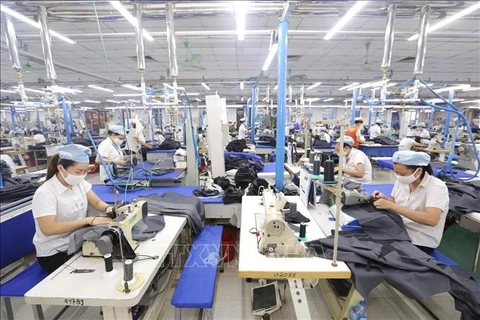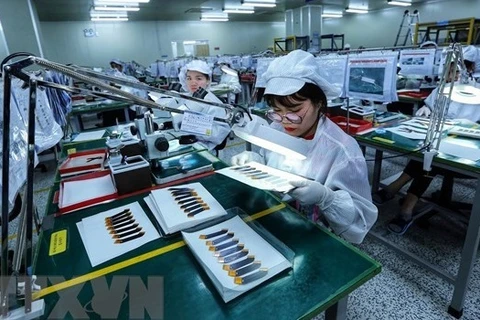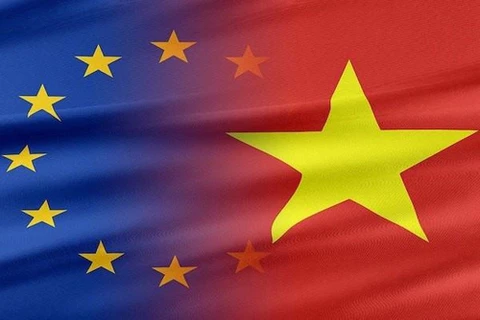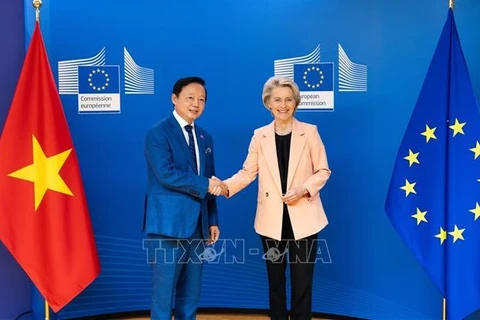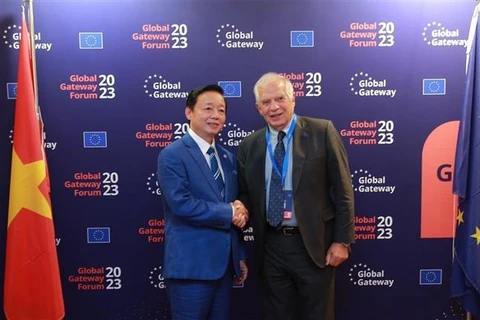Brussels (VNA) - Deputy Minister of Foreign Affairs Le Thi Thu Hang and Acting Managing Director of Asia and Pacific of the European External Action Service (EEAS) Paola Pampaloni chaired the 4th meeting of the Vietnam - EU Joint Committee to implement the EU - Vietnam Partnership and Cooperation Agreement (PCA) on October 27 in Brussels.
At the meeting, the two sides informed each other about their respective socio-economic situation and foreign policies, comprehensively evaluated Vietnam - EU cooperation, especially in collaboration frameworks such as the defence - security dialogue, the trade committee of the Vietnam - EU Free Trade Agreement (EVFTA), activities of specialised subcommittees in the Vietnam - EU Joint Committee.
They said that Vietnam - EU relationship has recently seen positive development, demonstrated through the increased exchange of delegations and high-level contacts, and enhanced collaboration in trade - investment, defence - security, education - training, climate change response and development cooperation, and effective results of cooperation/dialogue mechanisms.
The EU highly valued Vietnam's impressive achievements in socio-economic development and international integration.
To strengthen the partnership and comprehensive cooperation between Vietnam and the EU in the coming time, the two sides agreed to continue to intensify the exchange of high-level delegations, coordinate to fully and effectively implement the EVFTA, and effectively promote existing cooperation/dialogue mechanisms.
They also agreed to further bolster cooperation across potential fields, especially trade - investment, development cooperation, green, digital and circular economy, modern and sustainable fisheries development and strong shifting to farming, clean energy transition, innovation, and infrastructure.
Deputy Minister Hang asked the EU to prompt the parliament of 10 of the 27 EU member countries to soon ratify the Vietnam - EU Investment Protection Agreement (EVIPA) to create new opportunities for bilateral trade and investment development, bolster cooperation and support Vietnam in developing its marine economy, including early removal of the IUU yellow card for the nation's seafood exports.
She suggested the EU continue to cooperate and support Vietnam in realising sustainable development goals (SDG), especially financial support, technology transfer, human resources training within the framework of the Just Energy Transition Partnership (JETP) between Vietnam and the International Partners Group, of which the EU is the coordinator.
Representatives of ministries and agencies at the meeting also proposed many specific measures to strengthen cooperation between the two sides in the fields of trade - investment, finance, development cooperation, climate change response, logistics, agriculture, and defence - security.
Deputy Minister Hang affirmed that Vietnam supports the strengthening of the ASEAN - EU strategic partnership, with priority given to stepping up trade - investment cooperation, responding to global climate challenges, the environment, natural disasters, epidemics, contributing to green and sustainable development, and sub-regional development cooperation, including the Mekong sub-region.
Agreeing with the Vietnamese side’s proposals, the EU announced the priorities in its Cooperation Strategy with the Indo-Pacific region and Global Gateway, and expected Vietnam to participate in cooperation projects within the framework of these strategies.
The EU highlighted Vietnam as the bloc’s very important partner in the Asia-Pacific region, and affirmed its continued support to Vietnam's sustainable development, serving as a model for EU cooperative relationships with other partners around the world.
The EU proposed that the two sides continue to boost cooperation in key areas of relations including politics - diplomacy, trade - investment, defence - security, climate change response, while expanding cooperation in new areas such as tax, biodiversity conservation, global plastic waste treatment, labour and illegal migration prevention.
Regarding international and regional issues of shared concern, the two sides consented to promote multilateralism and the role of the United Nations. They affirmed that disputes must be resolved by peaceful means on the basis of respect for international law and the basic principles of the UN Charter, while ensuring security, safety, and freedom of navigation and overflight in the East Sea in line with international law, especially the 1982 United Nations Convention on the Law of the Sea (UNCLOS 1982).
One day earlier, Deputy Minister Hang received Deputy Secretary General of the EEAS Helena Konig./.
At the meeting, the two sides informed each other about their respective socio-economic situation and foreign policies, comprehensively evaluated Vietnam - EU cooperation, especially in collaboration frameworks such as the defence - security dialogue, the trade committee of the Vietnam - EU Free Trade Agreement (EVFTA), activities of specialised subcommittees in the Vietnam - EU Joint Committee.
They said that Vietnam - EU relationship has recently seen positive development, demonstrated through the increased exchange of delegations and high-level contacts, and enhanced collaboration in trade - investment, defence - security, education - training, climate change response and development cooperation, and effective results of cooperation/dialogue mechanisms.
The EU highly valued Vietnam's impressive achievements in socio-economic development and international integration.
To strengthen the partnership and comprehensive cooperation between Vietnam and the EU in the coming time, the two sides agreed to continue to intensify the exchange of high-level delegations, coordinate to fully and effectively implement the EVFTA, and effectively promote existing cooperation/dialogue mechanisms.
They also agreed to further bolster cooperation across potential fields, especially trade - investment, development cooperation, green, digital and circular economy, modern and sustainable fisheries development and strong shifting to farming, clean energy transition, innovation, and infrastructure.
Deputy Minister Hang asked the EU to prompt the parliament of 10 of the 27 EU member countries to soon ratify the Vietnam - EU Investment Protection Agreement (EVIPA) to create new opportunities for bilateral trade and investment development, bolster cooperation and support Vietnam in developing its marine economy, including early removal of the IUU yellow card for the nation's seafood exports.
She suggested the EU continue to cooperate and support Vietnam in realising sustainable development goals (SDG), especially financial support, technology transfer, human resources training within the framework of the Just Energy Transition Partnership (JETP) between Vietnam and the International Partners Group, of which the EU is the coordinator.
Representatives of ministries and agencies at the meeting also proposed many specific measures to strengthen cooperation between the two sides in the fields of trade - investment, finance, development cooperation, climate change response, logistics, agriculture, and defence - security.
Deputy Minister Hang affirmed that Vietnam supports the strengthening of the ASEAN - EU strategic partnership, with priority given to stepping up trade - investment cooperation, responding to global climate challenges, the environment, natural disasters, epidemics, contributing to green and sustainable development, and sub-regional development cooperation, including the Mekong sub-region.
Agreeing with the Vietnamese side’s proposals, the EU announced the priorities in its Cooperation Strategy with the Indo-Pacific region and Global Gateway, and expected Vietnam to participate in cooperation projects within the framework of these strategies.
The EU highlighted Vietnam as the bloc’s very important partner in the Asia-Pacific region, and affirmed its continued support to Vietnam's sustainable development, serving as a model for EU cooperative relationships with other partners around the world.
The EU proposed that the two sides continue to boost cooperation in key areas of relations including politics - diplomacy, trade - investment, defence - security, climate change response, while expanding cooperation in new areas such as tax, biodiversity conservation, global plastic waste treatment, labour and illegal migration prevention.
Regarding international and regional issues of shared concern, the two sides consented to promote multilateralism and the role of the United Nations. They affirmed that disputes must be resolved by peaceful means on the basis of respect for international law and the basic principles of the UN Charter, while ensuring security, safety, and freedom of navigation and overflight in the East Sea in line with international law, especially the 1982 United Nations Convention on the Law of the Sea (UNCLOS 1982).
One day earlier, Deputy Minister Hang received Deputy Secretary General of the EEAS Helena Konig./.
VNA

